Cannabis Generates 7x More Tax Revenue Than Liquor in Colorado in 2020 and Other Stunning Data Across the Cannabis Industry
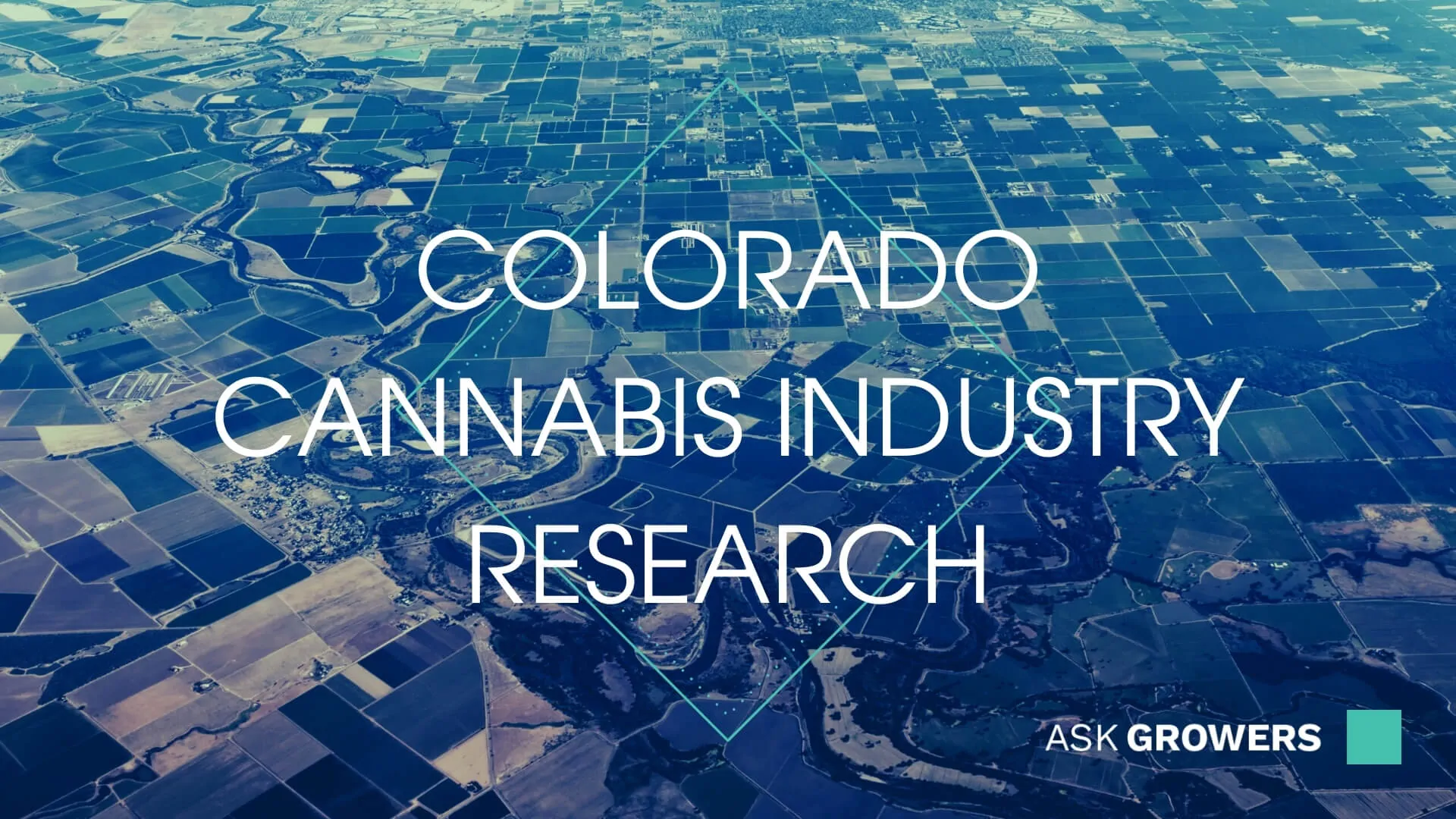
- Marijuana Sales by Month/Year in Colorado
- Costs of Cannabis Per Gram and Number of Arrests for Illegal Distribution in Colorado
- Comparing Different Cannabis Products in Colorado
- Comparing Marijuana Taxes and Liquor Taxes 2020 in Colorado
- Cannabis Sales in Denver
- Cannabis: The Job Creator
- Cannabis Brands from Colorado About Industry
- Sources
It’s totally fair to say that the legal cannabis industry has absolutely exploded over the past two decades or so. Even since the state of California got the ball rolling back in 1996 via Proposition 215, we’ve seen a total of 36 states, the District of Columbia, Guam, Puerto Rico and, the U.S. Virgin Islands all approved comprehensive, fully legal medical cannabis programs.
One of the first states to decriminalize cannabis in 1975, then establishing legal medical and recreational cannabis programs in 2000 and 2012 respectively. As a result of being ahead of the legalization curve, Colorado has made itself a hud for legal cannabis in both the U.S. and the world with some of the largest, most creative, and innovative cannabis brands and entrepreneurs.
Since cannabis was legalized in Colorado, it’s generated hundreds of millions of dollars a year for the state. That’s a massive industry for most small countries, let alone a state with a population of only nearly 6 million. Here at AskGrowers, however, we want to dig a little deeper into those numbers and provide a bigger picture and a fuller understanding for our readers. Let’s get right into it, shall we?
Marijuana Sales by Month/Year in Colorado
To put it bluntly, cannabis has been a consistent success story in the state of Colorado. Sales figures when it comes to cannabis have either been rock-steady and reliable or have progressively grown larger year-by-year.
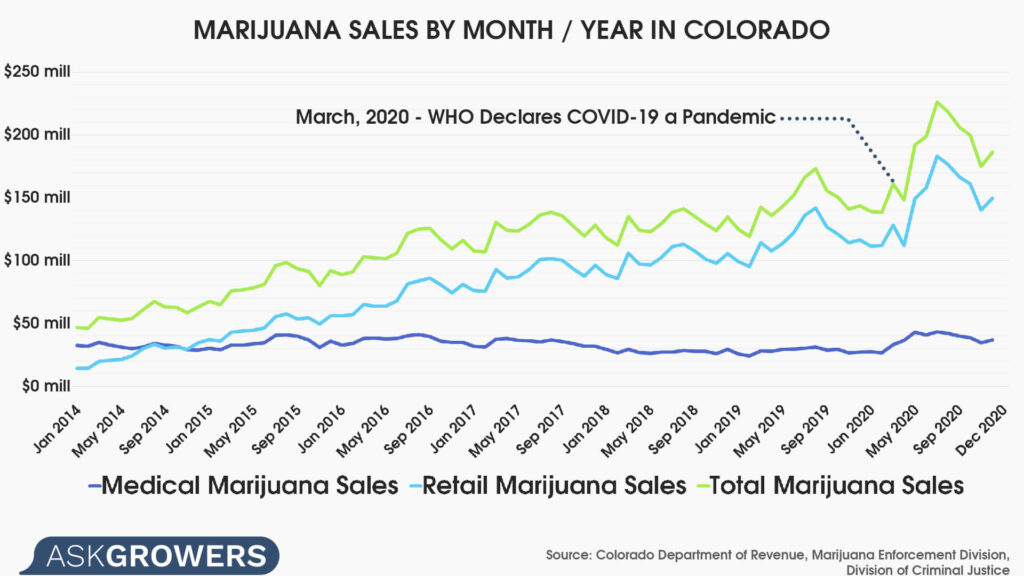
As you can see from the graphic above, medical cannabis numbers have been incredibly consistent over the course of the last six years. That consistency for the medical program might have to do with the existence of a recreational program, however. According to the Marijuana Policy Project, the state of Colorado only has about 81,000 registered medical patients. That’s only about one and a half percent of the state’s total population.
Where cannabis in the state of Colorado really shines is when it comes to retail cannabis sales. After all, what’s the sense of signing up for the medical program when you freely and legally have access to high-quality, affordable cannabis at a local dispensary as a regular consumer?
And boy, do Colorado residents love their legal weed! According to the Colorado Department of Revenue, 2020 was a record-breaking year for cannabis sales. Total cannabis sales passed $2 billion, the highest sales have ever been since legalization.
A key aspect to that record-breaking year, surprisingly, might be due to the on-going global pandemic. As you can see from the graphic above, there was a massive spike in legal cannabis purchases coinciding with the WHO declaring COVID-19 a pandemic.
That spike makes a lot of sense for a few reasons. First, there was a ton of uncertainty surrounding which businesses would stay open in the midst of the lockdowns. It makes sense for those who enjoy or rely on cannabis for easing aches and pains to stock up while they could. Secondly, that spike in sales may be attributed to the stress-reducing, sleep-aiding properties of cannabis. The lockdowns all over the world were a stressful time for many, with social isolation, stresses around employment, and general worry-based anxiety symptoms wreaking havoc on people’s mental health. It only makes sense to turn to something like cannabis to help cope.
Costs of Cannabis Per Gram and Number of Arrests for Illegal Distribution in Colorado
Cannabis and criminal justice are, unfortunately, totally intertwined. Because of the outdated and continued federal prohibition of legal cannabis of any kind, a thriving black market for cannabis still exists in the U.S.
The U.S. black market for cannabis is still estimated by experts to be worth billions, despite states like Colorado, California, and Oregon all making hundreds of millions, if not billions, from legal recreational sales.
Unsurprisingly, however, in places where legal cannabis is inexpensive and easy to access, arrests for both selling and buying cannabis drop. Not only has this drop happened on a state-wide scale in Colorado, as you can see from the graphic, it’s also worked on a nationwide scale. Canada, a nation that recently fully legalized recreational cannabis use, saw a massive falloff in illegal sales after legalization with people opting to purchase their cannabis from legal, well-regulated dispensaries instead of their shady local dealer.
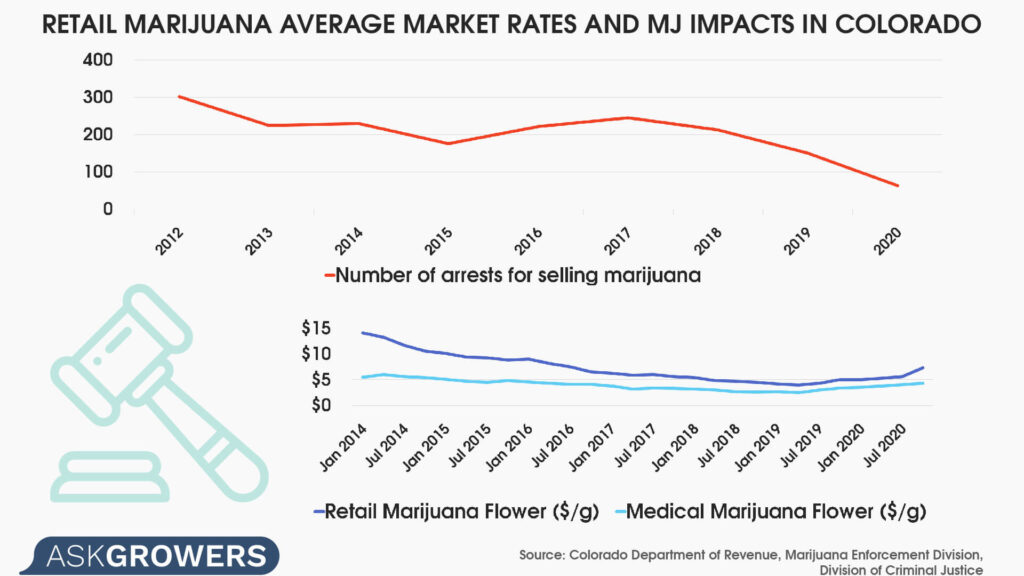
Comparing Different Cannabis Products in Colorado
As the legal cannabis industry has matured and changed, so have the methods and forms of cannabis that people choose to consume. After all, it’s not 1960 anymore. There are way more options for ways to consume cannabis than the packaging of poorly grown less potent weed and lighting up.
For Colorado cannabis consumers, concentrates and edibles have slowly but surely become the preferred way of taking in cannabis. After all, when it comes to getting the most bang for your buck when it comes to THC content, concentrates are hard to beat.
Meanwhile, it’s no surprise that flower sales have slumped. Buying cannabis flower can often be expensive, the flower itself is difficult to carry and store safely, and the idea of a few drops for a tincture or drags from a disposable pen sounds much easier than processing, grinding, and smoking flower is. It’s also worth considering that many cannabis users might be trying to cut back on their smoking due to COVID. After all, a virus that primarily attacks and destroys someone’s lungs has a way of making people more conscious about taking care of their upper respiratory system.
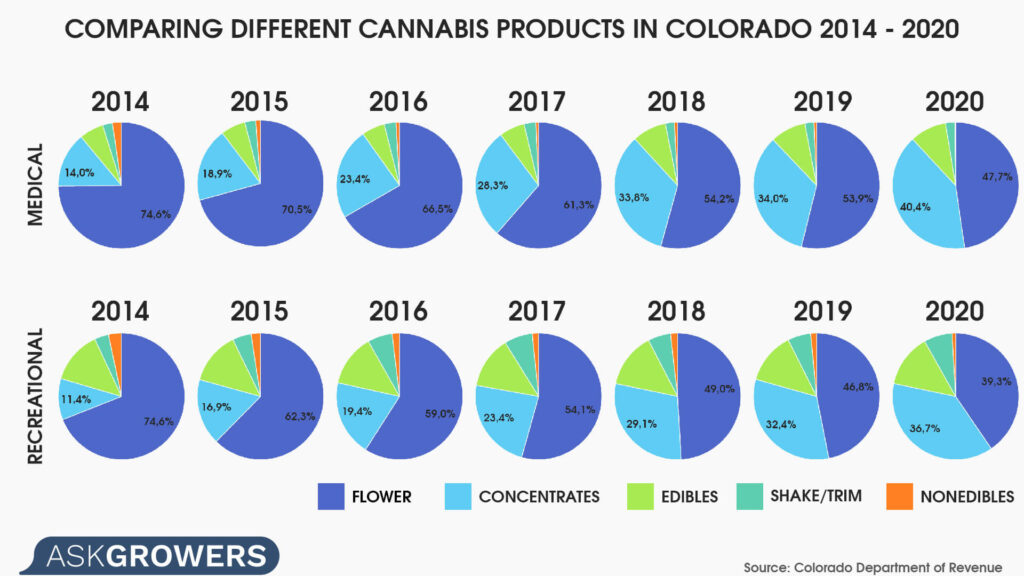
Comparing Marijuana Taxes and Liquor Taxes 2020 in Colorado
Colorado is a test-book example of why so many U.S. states, especially after having their budgets impacted by COVID, are looking to legalize cannabis. And when you take a deeper look at the numbers, like we did in the graphic below, it’s clear and obvious to see why so many states are ready to start milking the cannabis cash-cow.
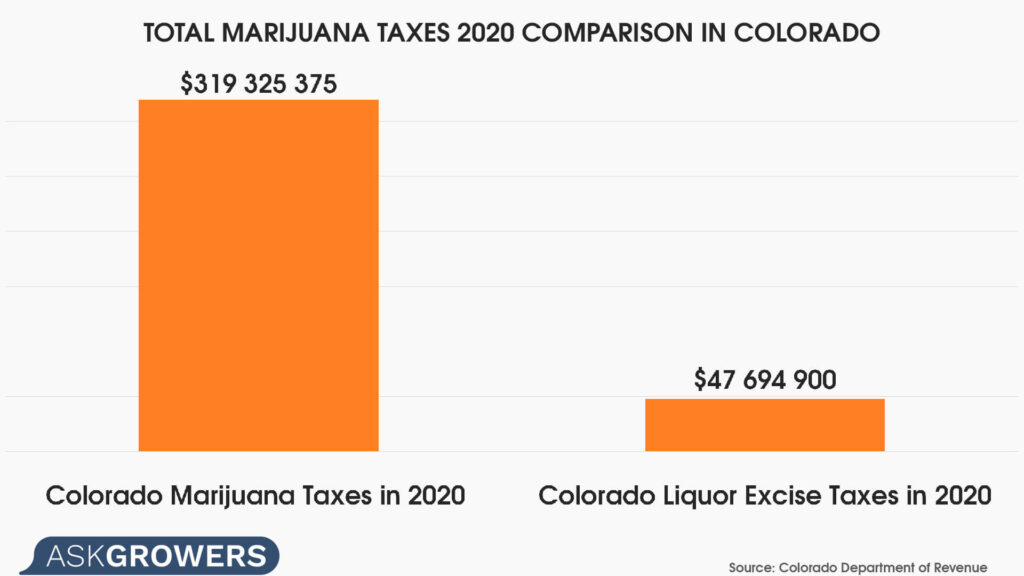
As we mentioned before, Colorado raked in an astounding $2 billion in profits last year, collecting $319,325,375 in the process. That’s thanks to Colorado’s 2.9 percent sales tax from both medical and recreational marijuana sales, and a 15 percent excise tax on retail marijuana. All in all, the state of Colorado makes A LOT of money from cannabis sales.
Sixty-fix percent of the total revenue comes from the state’s 15 percent retail excise tax, and 90 percent of this subtotal is reserved for the general fund while local governments are given the remaining 10 percent. That money collected from cannabis sales taxes is set to be appropriated to local governments and the state’s education, transportation, and marijuana cash tax funds.
When you compare that massive amount of money to how much that state makes from alcohol sales, it’s clear that there’s no real comparison to be made.
Cannabis Sales in Denver
Denver, along with being the capitol of the state of Colorado, is the capitol of the Colorado cannabis community as well.
As you can see from the graphic below, the lovely people of Denver certainly love their cannabis. Per capita, each Denver citizen buys $1,161 worth of cannabis products each. That’s about $96.75 in cannabis per person every single month.
That must be why they call it the “Mile-High City!”
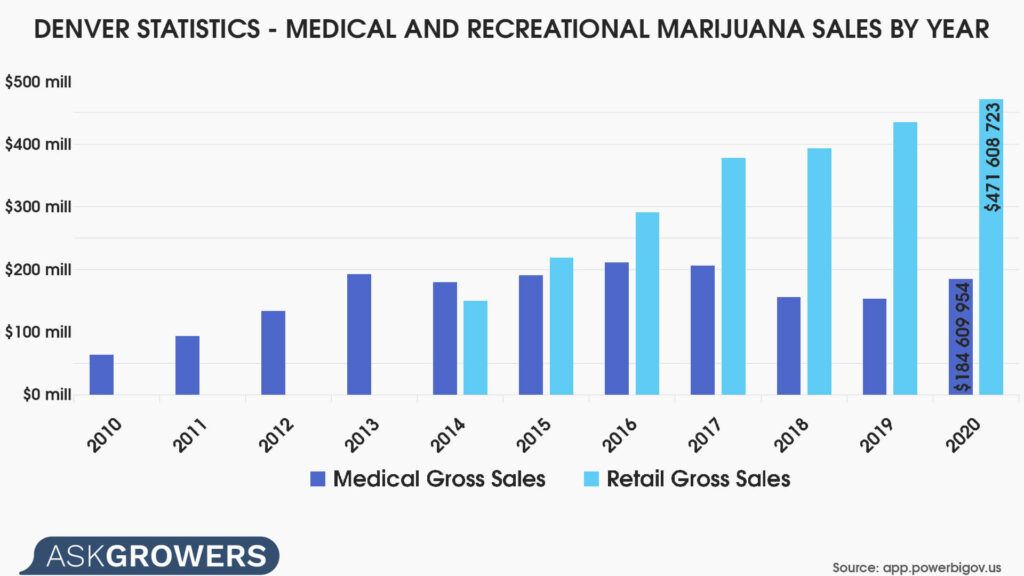
Cannabis: The Job Creator
On top of being a fantastic money-maker for the state and local governments, the legal cannabis industry is also a job creator.
As you can see from the graphic below, the legal cannabis industry in the state of Colorado alone employs nearly 40,000 more people than the year before. Nationwide, the legal cannabis industry creates slightly less than 250,000.
The legal cannabis industry is projected to be the fastest-growing job creator between 2018 to 2028, expected to explode by nearly 250 percent. As more and more states push for legalization, those numbers are going to explode even higher. It’s also worth noting that many states deemed medical cannabis workers essential during the COVID lockdowns, meaning folks in the legal cannabis industry were able to stay employed and keep collecting paychecks while many weren’t as fortunate.
So not only does legalize cannabis generate a ton of revenue for the state and reduce crime, the legal cannabis industry is putting people to work in the midst of a global pandemic.
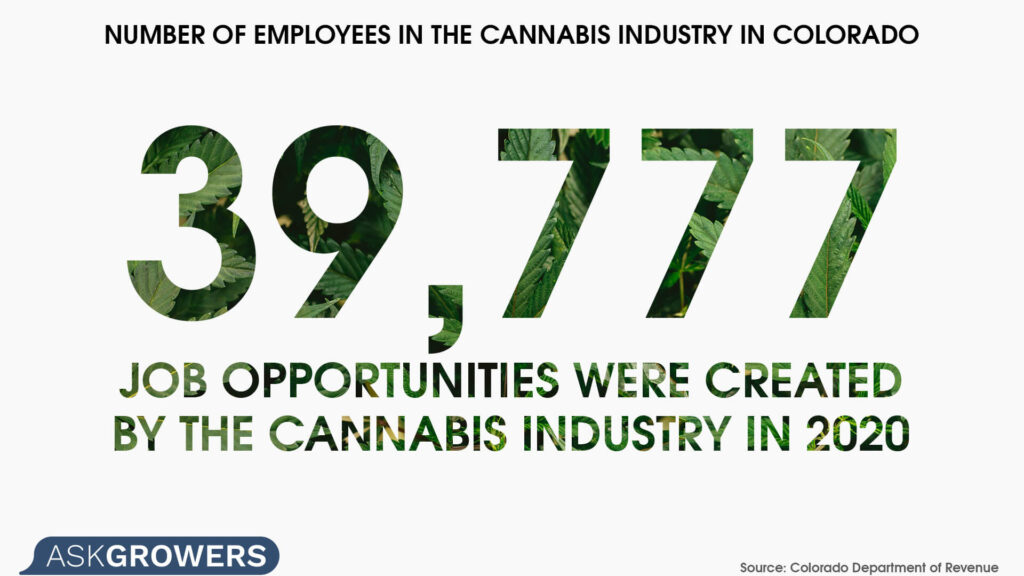
Cannabis Brands from Colorado About Industry
The legal cannabis industry is alive and booming not just in Colorado, but all over the U.S. As we’ve pointed out throughout this article, the legal cannabis industry in Colorado generates hundreds of millions of dollars, creates jobs, and has a real impact on reducing crime in communities.
These days, working for or running a cannabis business is about as normal as working in a supermarket or an office building. What sets cannabis apart is it’s profound ability to promote clean, natural medicine, racial equity, and criminal justice reform.
The best way to illustrate those commitments is from the source, right? Well, here at AskGrowers we consistently talk with some of the most innovative and cutting-edge cannabis industry entrepreneurs based in Colorado. So we say we let those creators speak for themselves!
The main features of the cannabis industry in Colorado that we wanted to reveal to you:
- Sustainable development in the cannabis industry
- Legalization and its aspects in the state
- The future of the industry
“I felt a sense of freedom [when weed was legalized]. Something that I have always perceived as illegal was no longer illegal. I realized at a younger age how alcohol is so much worse than cannabis, and was confused as to why cannabis was such a big deal, when other drugs like alcohol are so readily available.”
Anyone who is even a little familiar with cannabis will understand this statement by Alex Pasternak, Executive Vice President of Binske. 2012 was a turning point for both Alex and the entire population of Colorado.
We would like to take a closer look at how cannabis brands adhere to sustainable growing practices and state standards.
From the Newt Brothers, the leader in cannabis industry sustainability, in Denver:
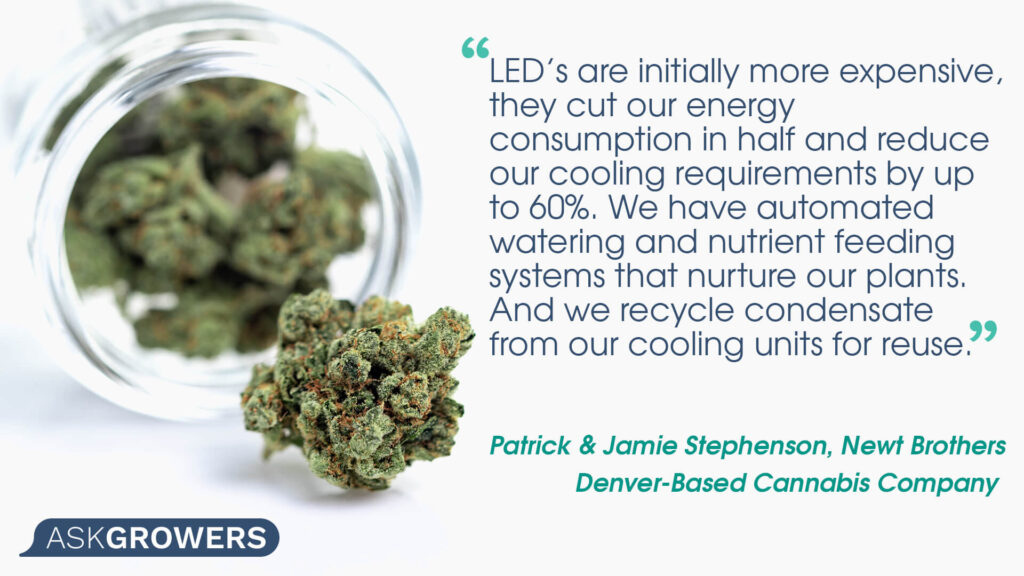
“Environmentally, we were one of Colorado’s and the nation’s first facilities to utilize LED lighting exclusively. While LED’s are initially more expensive, they cut our energy consumption in half and reduce our cooling requirements by up to 60%. We have automated watering and nutrient feeding systems that nurture our plants. And we recycle condensate from our cooling units for reuse. All the research, testing, and hard work results in a cannabis flower that is incredibly clean, safe, and of optimal connoisseur quality. The results are the message our product conveys to the Colorado cannabis community.”
Also, Newt Brothers and Neale D. Gibbons, CEO of SKM Wellness confirms that cannabis brands successfully comply with all environmental standards and their product passes all quality tests.
“Regulation is a large part of all legal cannabis in the USA. Colorado uses a tracking system called METRC to monitor all the activity within a cannabis facility. Adherence to all cannabis METRC regulations is a requirement to operate a cannabis company legally in Colorado. Every action within the licensed facility, from cloning to flower, and extraction must be recorded into the METRC tracking system. The system, although time-consuming, maintains a strict level of transparency throughout the cultivation, growth, and extraction process.” - Newt Brothers.
“In our main state of operation, the Colorado Department of Agriculture has a very concise list of approved products for these purposes. Once harvested, the State Marijuana Enforcement Division has very strict standards for quality testing before the product can be sold to the public to make sure only clean/safe products make it to market. The evidence-based Integrated Pest Management (IPM) program that we use voluntarily exceeds these standards.” - SKM Wellness
Despite the incredible achievements of cannabis businesses and impeccable adherence to environmental standards in the example of Colorado, there are still problems in the United States regarding the federal legalization of cannabis.
Newt Brothers: “The fact that cannabis is still saddled with a schedule one drug classification is kind of mind-blowing. Keeping cannabis federally illegal just does not make any sense at this point. It really hurts the small cannabis businesses that struggle to stay afloat with unnecessarily harsh regulations. This is despite the heavy taxes the industry pays to local and state governments. There has been real progress in the industry in the last ten years of legalization, and related research has uncovered previously unknown benefits from cannabis. But now it’s time to provide access to cannabis globally, just like alcohol.”
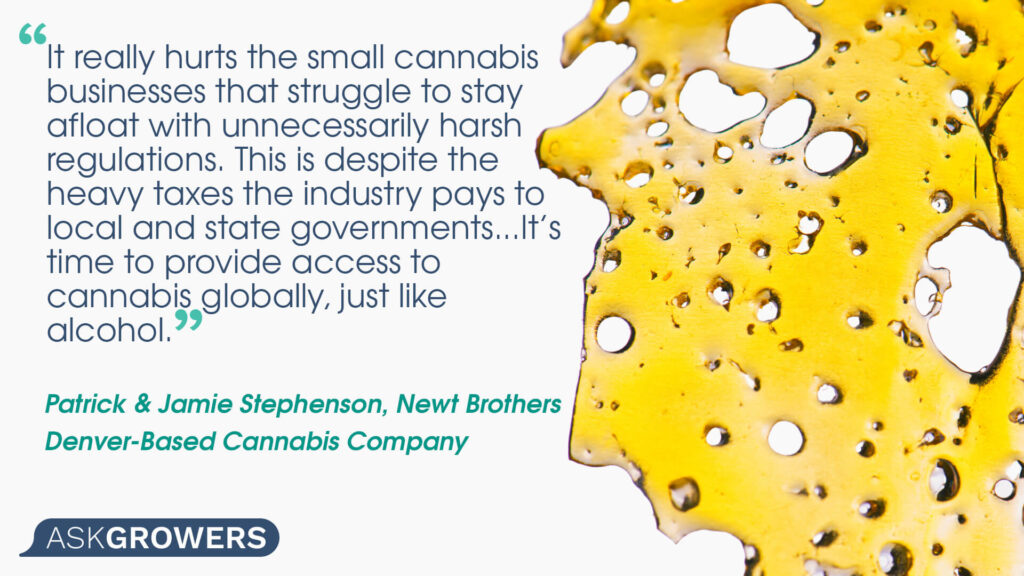 Cait Curley, cannabis-industry influencer and entrepreneur, is of the same opinion: “The current state of cannabis being federally illegal is the biggest challenge [for the industry itself]. I think the speaking engagements outside of the cannabis industry have a larger impact when it comes to pushing legislation. It’s important for me to keep things simple, calm and to the point. Education is so vital. Giving people valuable information on why cannabis is illegal and what legalization could do for our planet and people is crucial in the attempt to evolve their mindset. Speaking to the choir/ industry at an event about a specific bill can also be beneficial to get everyone on the same page”.
Cait Curley, cannabis-industry influencer and entrepreneur, is of the same opinion: “The current state of cannabis being federally illegal is the biggest challenge [for the industry itself]. I think the speaking engagements outside of the cannabis industry have a larger impact when it comes to pushing legislation. It’s important for me to keep things simple, calm and to the point. Education is so vital. Giving people valuable information on why cannabis is illegal and what legalization could do for our planet and people is crucial in the attempt to evolve their mindset. Speaking to the choir/ industry at an event about a specific bill can also be beneficial to get everyone on the same page”.
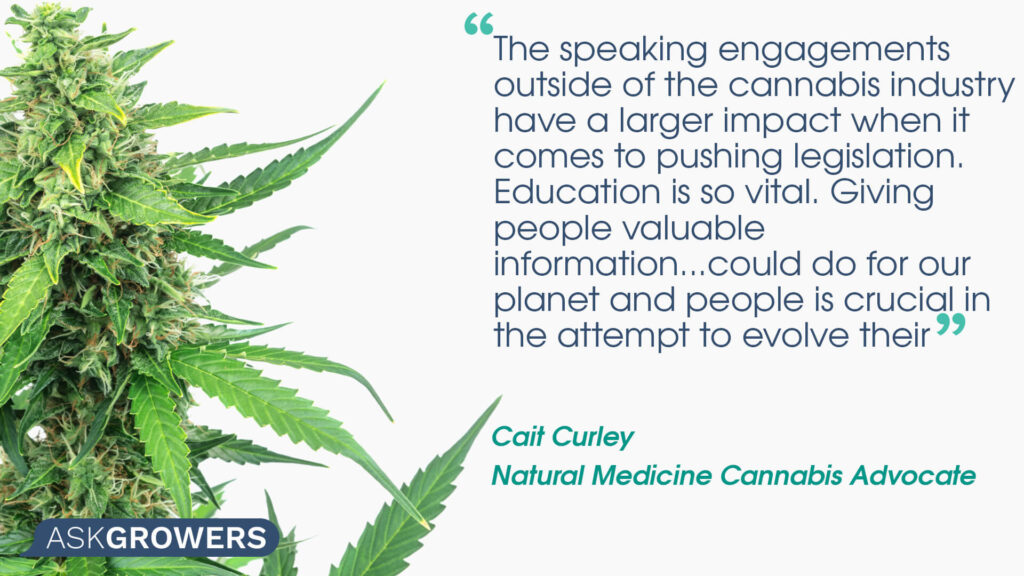
Representatives of the cannabis industry are accustomed to fighting for their cause and their rights, and most of them are positive about an early federal legalization and boldly look to the future. Like the guys from SKM Wellness: “I would suggest that we are about to see the best-case scenarios play out in this country as the tides of change are sweeping across this land. Since the elections in November, we have seen several new states enter the legalized/regulated market. We have seen the MORE Act pass in the House, one of the few bills to pass with strong bipartisan support in recent years.
In addition, the United Nations Commission on Narcotic Drugs recently approved a recommendation from the World Health Organization to remove cannabis and cannabis resin from its Schedule IV classification under the 1961 Single Convention on Narcotic Drugs. The incoming Presidential administration is poised to enact some large changes. At the citizen level, a recent Gallup Poll also showed us that 68 percent of Americans are now in favor of legalization, a new all-time high. These hallmarks all come at a time when cannabis sales are smashing industry sales records as more people turn to the plant during the current pandemic.This picture, to me, paints a promising and fast-moving next few years where substantial gains in legalization and social acceptance will lead to a strong future for the cannabis marketplace.”
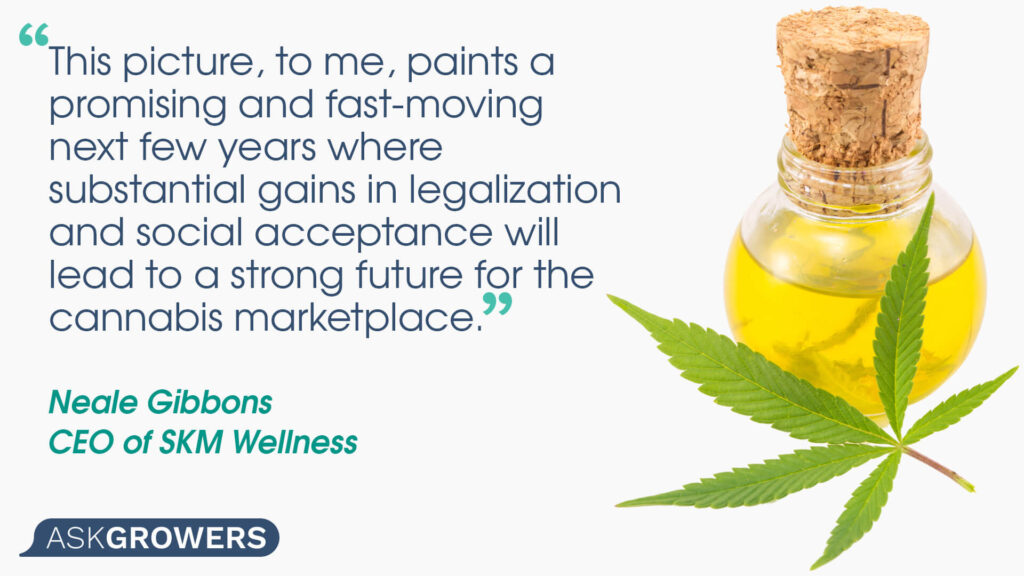
Brands like Newt Brothers and Mountain High Suckers are already planning their development to the fullest.
“We will be working in more states as legalization becomes a reality. It’s a given that Newt Brothers will be a national brand, but the thought of creating a worldwide brand is becoming more and more appealing.” - Newt Brothers.
“We were the first company in Colorado to sell a CBD/THC infused edible to another licensed company and we were also the first company to provide a readout on every product that specifies all cannabinoids in the package. Another aspect of our products comes from the nature of our extraction, we produce a whole plant ethanol extraction that yields a more holistic product than is found elsewhere in the industry.” - Mountain High Suckers.
Read Also: Cannabis in Colorado

 Industry
Industry

.jpg)
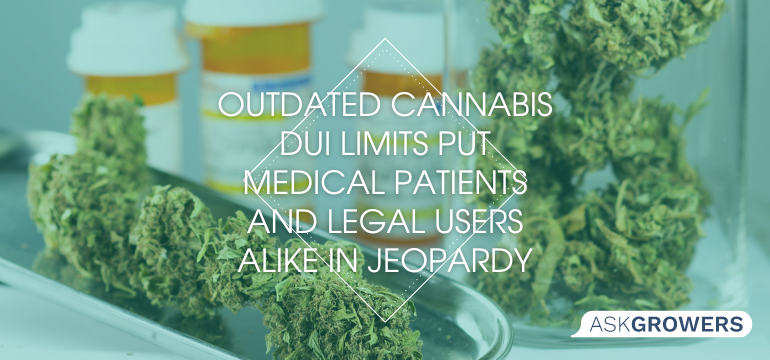
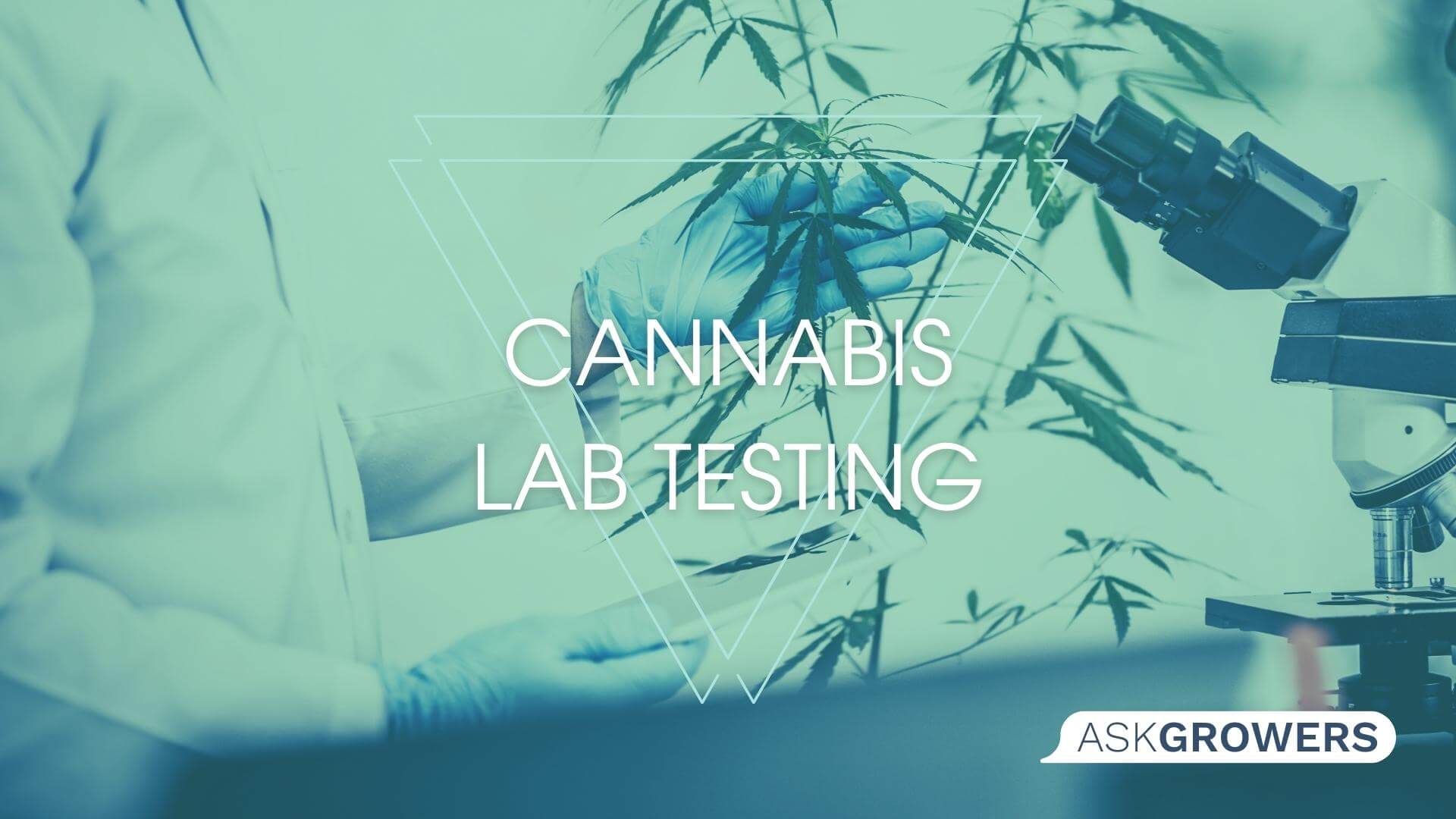
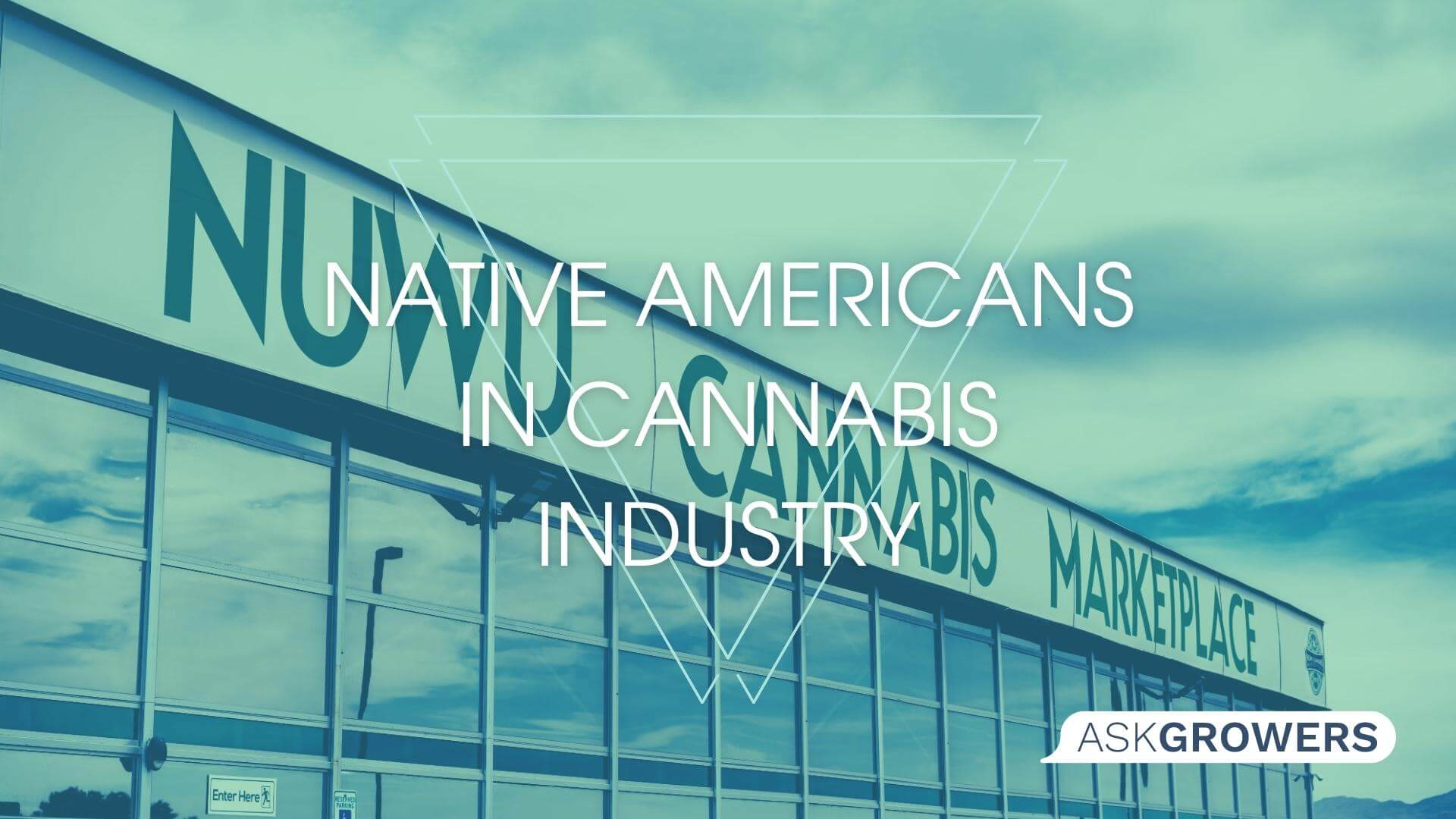
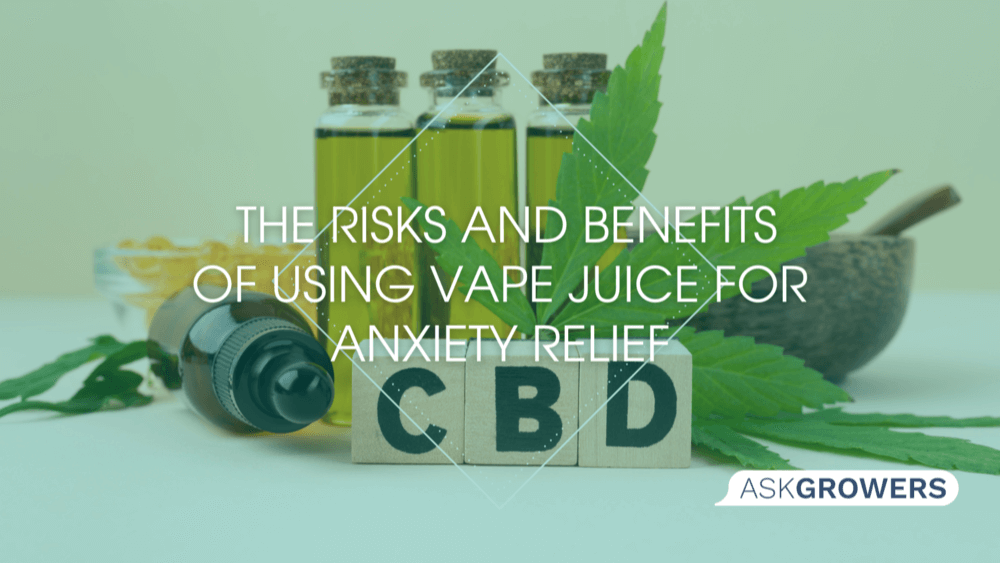
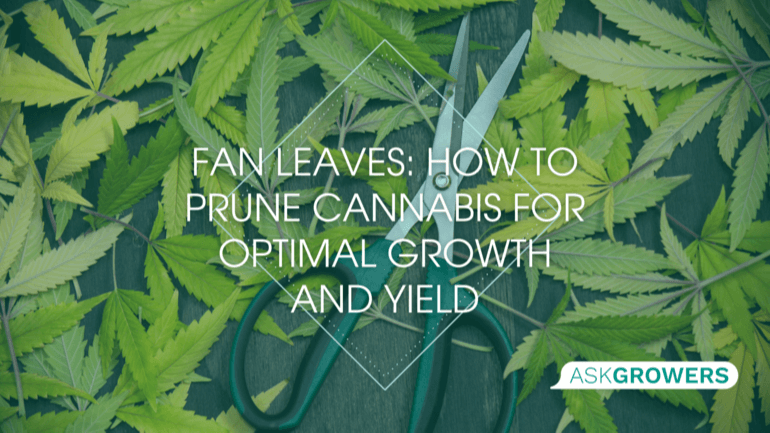
 (1).png)
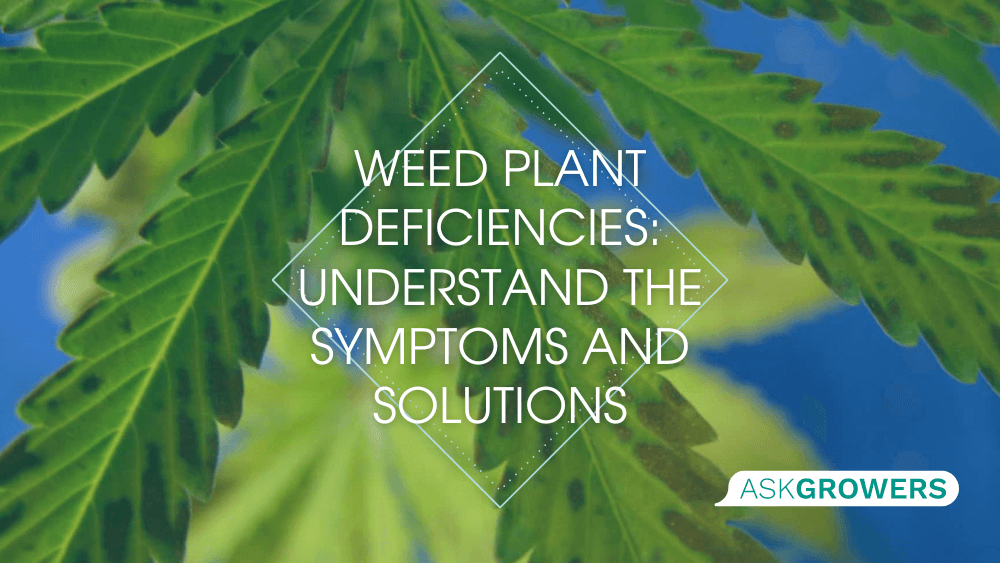
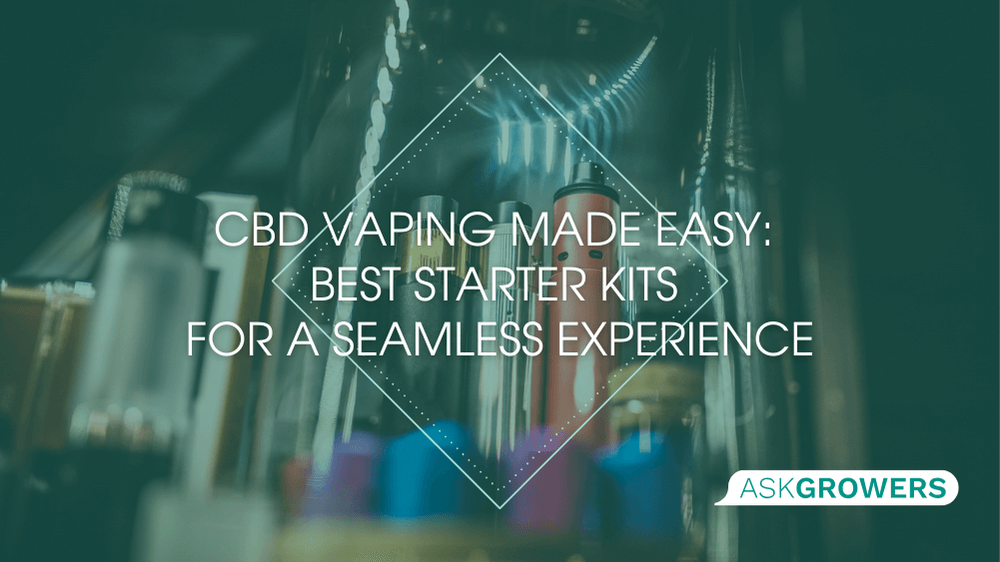
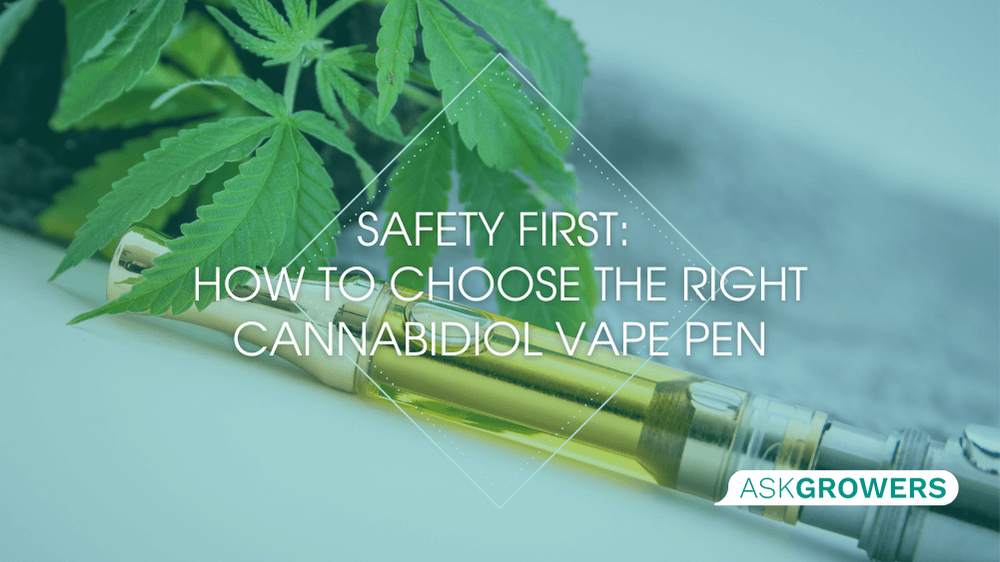
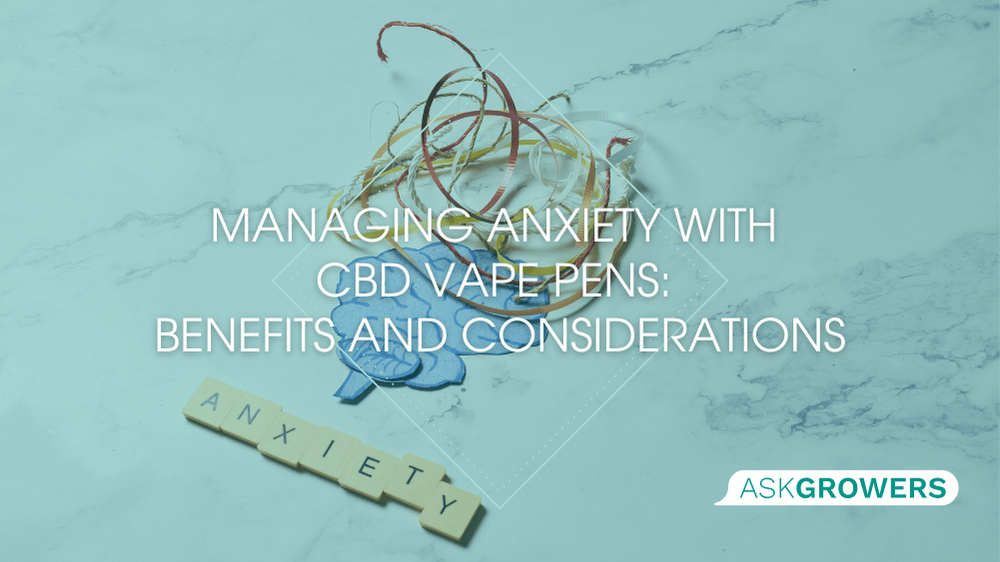
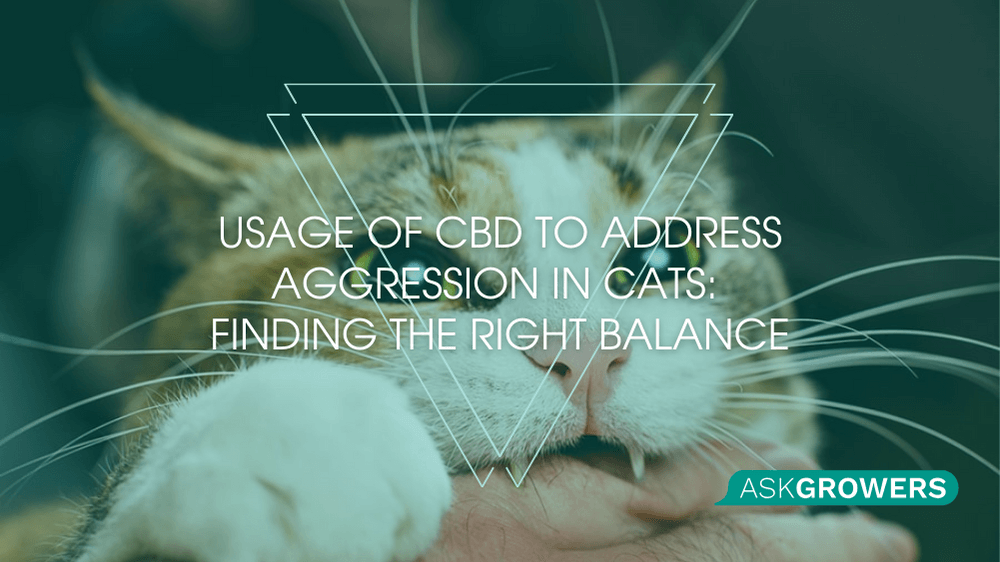
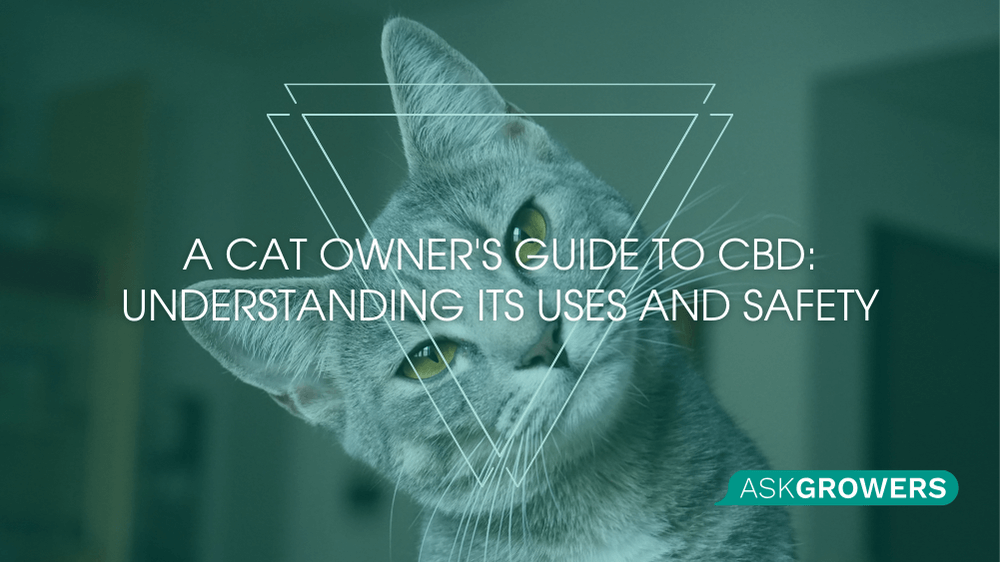
Be the first and share your opinion
Write a Review